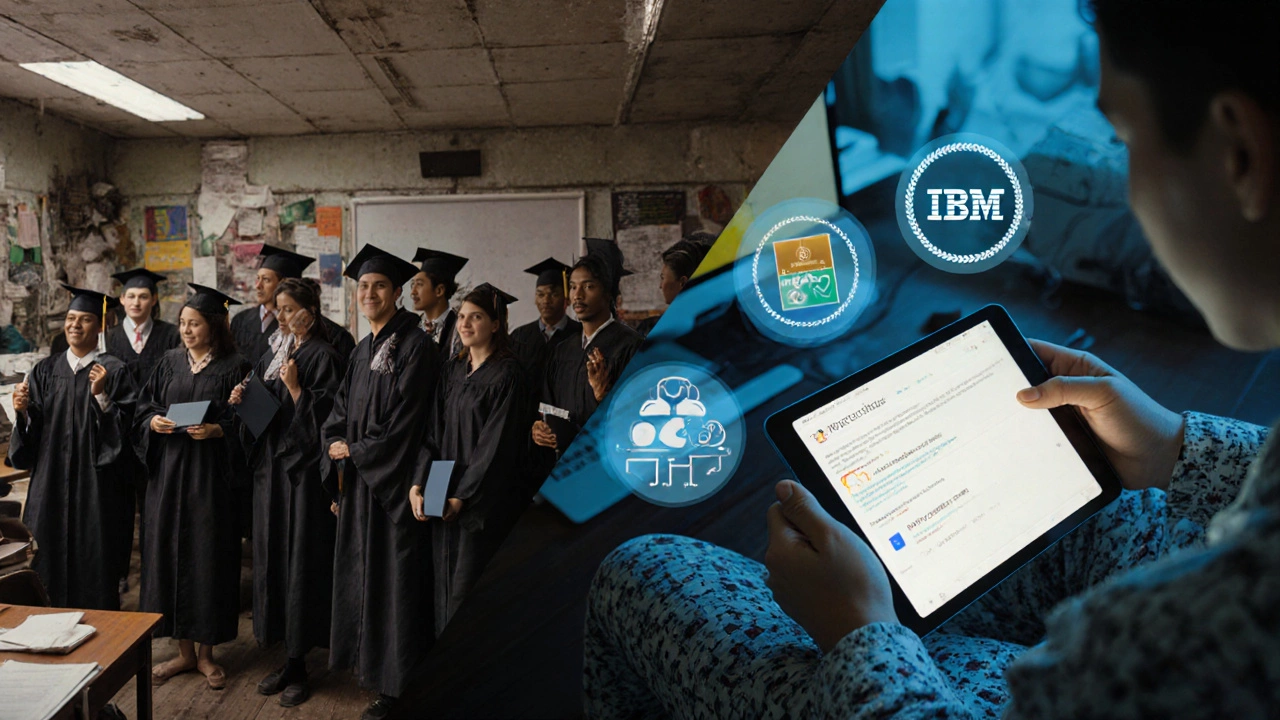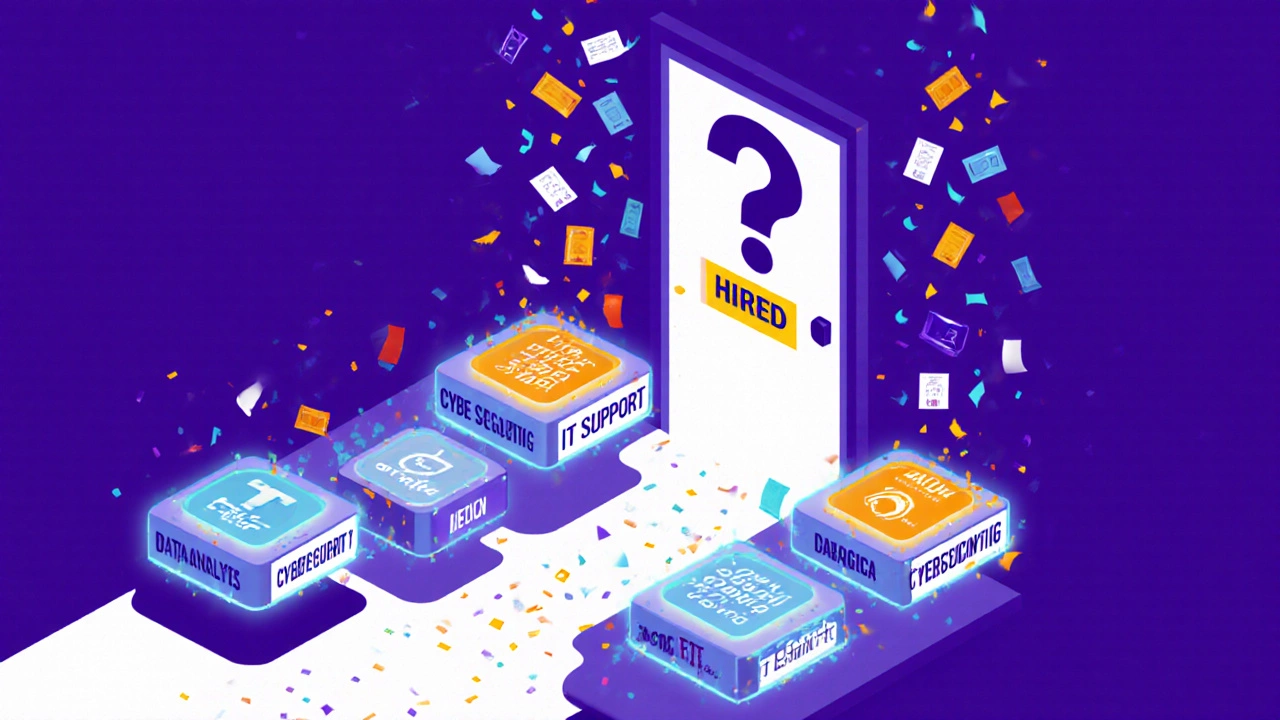
Online Degree Job Placement Calculator
Find Your Best Career Match
Select your preferences to discover which online program is best for you.
Your Career Match Results
Select your preferences to see your match
Let’s cut through the noise: no degree is truly "easy" if you don’t put in the work. But some online degrees and certificates give you a much clearer, faster path to a job than others-especially in 2025. If you’re looking to switch careers, get hired quickly, or earn more without spending years in school, you don’t need a traditional four-year degree. You need the right skills, taught in the right way, with employers already waiting to hire.
What "easiest to get a job" really means
When people ask "which degree is easiest to get a job?", they’re not asking about GPA or how hard the classes are. They’re asking: Which program gets me hired fastest, with the least time and money spent? The answer isn’t about prestige. It’s about demand.
In 2025, employers aren’t scanning resumes for "Bachelor of Arts in Psychology" unless it’s paired with real, demonstrable skills. They’re looking for people who can fix IT systems, manage data, run digital ads, or support customers online. That’s why certificates and associate-level online degrees in technical fields are outpacing traditional degrees in job placement rates.
A 2024 LinkedIn Workforce Report showed that 62% of hiring managers in the U.S. and India now prioritize skills over degrees for entry-level roles. And 43% of those roles were filled by candidates with only online certificates or bootcamps-not bachelor’s degrees.
The top 5 online degrees and certificates with the highest job placement
Here are the programs that actually lead to jobs in 2025, ranked by speed to hire and employer demand.
1. IT Support Certificate (Google Career Certificates)
Google’s IT Support Certificate is the most straightforward path into tech. It takes 3-6 months part-time. You learn how to troubleshoot Windows and macOS, set up networks, use remote support tools, and handle basic cybersecurity.
Companies like Amazon, Verizon, and Bank of America directly hire graduates. The program has a 70% job placement rate within six months of completion. No prior experience needed. You don’t even need a high school diploma in some states-just the willingness to learn.
2. Data Analytics (IBM Data Analyst Professional Certificate)
Data is everywhere. Every business-from local clinics to global retailers-needs people who can turn messy spreadsheets into clear insights. IBM’s online certificate teaches Excel, SQL, Tableau, and Python basics for data cleaning and visualization.
Graduates land roles like Junior Data Analyst, Business Intelligence Associate, or Operations Analyst. Median starting salary: $58,000 in the U.S. The program is 6 months long, costs under $300, and includes real-world projects you can put on your resume.
3. Digital Marketing (HubSpot Academy Certifications)
Every company needs to attract customers online. HubSpot’s free certifications in inbound marketing, email campaigns, SEO, and social media ads are trusted by over 100,000 employers.
You don’t need a marketing degree to get hired. You just need to show you can run a Facebook ad that converts, write a blog that ranks on Google, or build an email list. Many entry-level marketing jobs now list "HubSpot Certified" as a preferred qualification.
4. Cybersecurity Fundamentals (CompTIA ITF+)
Cyberattacks are rising. Small businesses can’t afford to wait for expensive IT teams. That’s why demand for entry-level cybersecurity roles jumped 40% in 2024.
CompTIA ITF+ is the easiest entry point. It covers threats, data protection, network security, and basic ethical hacking. The exam costs $199. Most people pass in under 3 months of part-time study. Employers like Microsoft, Cisco, and local government agencies accept it as a baseline hire.
5. Medical Coding and Billing (AAPC Certificate)
Healthcare isn’t slowing down. And every doctor’s office, hospital, and insurance company needs people who can translate medical visits into billing codes.
The AAPC Certified Professional Coder (CPC) credential is the gold standard. Online programs take 4-8 months. You learn ICD-10, CPT, and HCPCS coding systems. Job placement is over 80%. Many graduates work from home. Starting pay: $45,000-$55,000. No science degree required.

Why these work better than traditional degrees
Traditional degrees take 2-4 years. These programs take weeks to months. You don’t pay $30,000. You pay $200-$1,000. And you’re not learning abstract theories-you’re learning tools employers use today.
Here’s how they stack up:
| Feature | Online Certificate (e.g., Google IT Support) | Traditional Bachelor’s Degree (e.g., Computer Science) |
|---|---|---|
| Time to complete | 3-6 months | 4 years |
| Average cost | $200-$1,000 | $20,000-$80,000 |
| Job placement rate (first 6 months) | 65-80% | 40-55% |
| Required prior experience | None | Often preferred |
| Remote work options | High (70%+) | Variable (30-50%) |
These certificates don’t just cost less-they’re designed for hiring pipelines. Google, IBM, and CompTIA partner directly with companies to recommend their graduates. You’re not applying blindly. You’re being referred.
What to avoid
Not all online degrees are created equal. Stay away from these:
- "Bachelor of Arts in General Studies" from unaccredited schools-employers don’t recognize them.
- "Master’s in Leadership" with no technical skills-too vague.
- Programs that promise "guaranteed job" for $10,000-those are scams.
- Degrees from schools that don’t list employer partners or graduate outcomes.
Always check: Does the program have a job board? Do they publish placement stats? Can you talk to a graduate? If not, walk away.

How to pick the right one for you
Ask yourself three questions:
- What do I enjoy doing daily? (Do you like fixing things? Working with numbers? Talking to people?)
- How much time can I commit per week? (2 hours? 10 hours?)
- What’s my salary goal in 12 months? ($40K? $50K? $60K?)
For example:
- If you like helping people and don’t mind paperwork → Medical Coding
- If you’re good with computers and hate sitting in meetings → IT Support
- If you like writing and social media → Digital Marketing
- If you’re calm under pressure and like puzzles → Cybersecurity
- If you love numbers and spreadsheets → Data Analytics
There’s no "best" degree. Only the best fit for your life right now.
Next steps: How to start today
You don’t need to wait for the next semester. Here’s your 7-day plan:
- Visit Google Career Certificates on Coursera. Enroll in the IT Support program. It’s free to audit.
- Watch the first two modules. Do the practice quizzes.
- Go to LinkedIn. Search "IT Support Specialist". Look at the job posts. Read the skills listed.
- Compare them to what you just learned. If they match, you’re on the right track.
- Sign up for HubSpot Academy. Complete the Inbound Marketing certification.
- Update your LinkedIn profile. Add "Google IT Support Certificate in progress" under "Licenses & Certifications".
- Apply to 5 entry-level remote support jobs. Don’t wait until you’re "ready"-you’ll never feel ready.
People who get hired fastest aren’t the ones with the most degrees. They’re the ones who started before they felt prepared.
